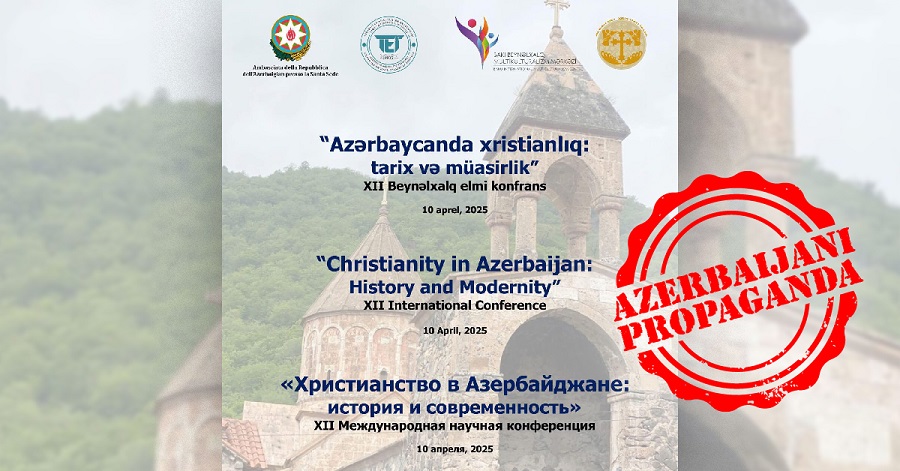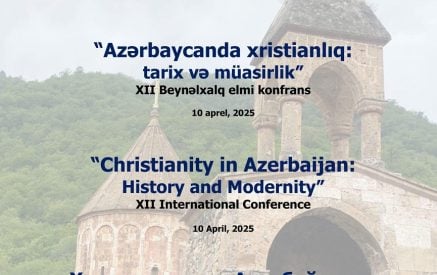Your Eminence Cardinal José Tolentino de Mendonça,
Chancellor of the Pontifical Gregorian University,
Reverend Father Mark Lewis,
Rector of the Pontifical Gregorian University,
On April 10, Azerbaijan organized an international conference at the Pontifical Gregorian University of the Holy See, titled “Christianity in Azerbaijan: History and Modernity.”
It is reprehensible to distort, rewrite, and exploit history for political purposes under the guise of science. The conference held at the Pontifical Gregorian University, which was funded by the Azerbaijani Embassy to the Holy See, was organized precisely for that purpose.
Read also
The title of the conference is deceptive and creates a misleading impression that present-day Azerbaijan is a country with an ancient, centuries-old Christian history. We are confident that both the university and the host party, as well as the participants, were fully aware of the problematic nature of the conference’s title. It is evident that under the false heading of “Christianity in Azerbaijan,” what was actually presented was the centuries-old Christian history of Caucasian Albania, Artsakh, and Nakhichevan. We are confident that both you, as a scholar, and the participants of the conference fully understand that the Christian heritage of Caucasian Albania, Artsakh, and Nakhichevan—whether Armenian or Caucasian Albanian—has no historical, cultural, or religious connection to the modern Republic of Azerbaijan.
A rhetorical question arises: was academic ethics and integrity genuinely upheld at the conference, given that not a single presentation appears to have addressed the destruction of Christian heritage and Armenian churches in Azerbaijan, or their so-called “Albanization”? It is also strange that not a single presentation at the conference mentioned the Armenian people or Armenia—the first nation in the region to adopt Christianity as a state religion, in 301 AD.
This conference is yet another manifestation of Azerbaijan’s policy of manipulating history for political purposes and using it as a weapon. Weaponization of history by Azerbaijan is not a new phenomenon. Its goal is to legitimize the country’s aggressive ambitions in the region and to serve its political and military interests.
It is a fact that in September 2023, Azerbaijan launched a military attack and forcibly displaced the Armenian population of the Republic of Artsakh (Nagorno-Karabakh). Today, it continues the destruction and appropriation of Armenian cultural heritage. This is evidenced not only by various international organizations and states but also by satellite imagery and widely circulated videos on the internet. There are numerous statements of the Azerbaijani leadership containing open threats against the Republic of Armenia and the Armenian people. Azerbaijan’s leader openly threatens war and makes territorial claims against the Republic of Armenia.
The Azerbaijani historiography and propaganda, despite abundant primary sources and evidence, continue to falsify the history of the region in an attempt to erase the historical Armenian presence in Karabakh. Azerbaijani academic circles baselessly claim that Armenians only arrived in Karabakh in the early 19th century, and that the Armenian inscriptions on monuments were added during the 19th and 20th centuries.
The fact that the platform of this prestigious university was used for anti-Armenian rhetoric and historical distortion is evidenced by the speeches of the conference participants. In his address filled with historical falsifications, political scientist Fuad Akhundov falsely claimed: “Armenia destroyed the Albanian churches belonging to Azerbaijan’s Christian civilization,” “Armenians destroyed Albanian monuments located in the territory of Karabakh and have attempted to present them Armenian,” “by expelling the Azerbaijani population from its historical lands, Armenia has destroyed Azerbaijan’s historical heritage, altered and Armenianized place names and the architecture of Albanian churches,” etc. The opening of the conference was used to promote the narrative of “Azerbaijani multiculturalism” and to voice false accusations against Armenia.
It is regrettable that well-known scholars in the field also agreed to participate in the conference, such as Professor Jost Gippert of the University of Hamburg and Professor Gilles Authier of Sorbonne University, the School for Advanced Studies in the Social Sciences (Paris), who are both well-acquainted with the history and culture of the region. We hope they used their academic authority to present the truth and to refute the false narratives voiced during the event.
Dear leadership of the university, Azerbaijan allocates vast financial resources to organize such conferences and book presentations in various countries to promote its propaganda-driven narratives.
We sincerely hope that your esteemed university will exercise meticulousness in the future and will not allow its prestigious platform to be used for the dissemination of historical falsifications by Azerbaijan, the advancement of its aggressive policies, or efforts to erase the Armenian and Christian heritage of the region.
We also find it important to note that during the conference, the flag of the Vatican was placed alongside the Azerbaijani flag in the event hall— an act clearly aimed at giving the event more credibility and authority.
Geghard Scientific Analytical Foundation
April 12, 2025




















































